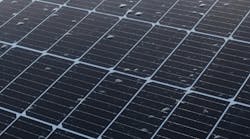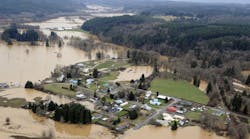Los Angeles Installs System to Treat Urban Runoff
In 2004, Los Angeles voters overwhelmingly passed Proposition O, which authorized the city to issue a series of bonds up to $500 million for projects to protect public health by cleaning up pollution in the city’s lakes, waterways, beaches and ocean. City staff particularly targeted the removal of trash, debris and bacteria conveyed in storm water runoff and dry weather flows before these pollutants could reach sensitive waterways. As one of the first projects funded by Prop. O, the Grand Boulevard Tree Wells project was selected to demonstrate the viability of capturing various target storm water pollutants conveyed along city streets in the Venice area, a high-density suburb in Los Angeles. It was the first fully funded Prop. O project in Los Angeles.
Venice is a residential neighborhood located next to popular tourist areas and local beach attractions. Storm water runoff from neighborhood and tourist areas convey a variety of highly concentrated pollutant discharges from adjacent retail, commercial and residential activities. Bacteria and other pathogen discharges have significantly impaired the health of the aquatic environment in the Venice Canals and impacted the economy of local businesses that support water enthusiasts and area tourism. In addition, Grand Boulevard is densely populated and provides limited space and opportunity for large treatment and collection systems that capture storm water runoff before pollutants discharge into adjacent waterways.
Project managers at the City of Los Angeles Department of Public Works (DPW) were tasked with identifying and selecting numerous locations along streets and roadways in Venice where pollutants typically discharge directly into the canals and the ocean. Upon completing their preliminary investigations, the DPW selected the Filterra Bioretention System.
The system was slated for seven locations along Grand Boulevard streets and adjacent roadways where the highest potential concentrations of trash, debris, sediments, nutrients, metals and bacteria could be captured and treated. Filterra was also chosen due to its compact design and allowance for green aesthetic features, which local retail businesses and residences preferred over larger and more intrusive storm water treatment systems.
Filterra’s small footprint and easy installation made it ideal for this high-density urban retrofit streetscape project. DPW staff chose Western Redbuds and Yedda Hawthorne trees for planting in each Filterra system, which matched existing landscape and added aesthetic features to the streetscape.
The system is effective at removing a variety of pollutants from storm water runoff. The engineered soil media captures and naturally biodegrades and filters out sediments, total suspended solids, nutrients, metals, oil/grease and bacteria from storm water runoff, while also reducing thermal impacts. The Filterra system offers a compact green solution that incorporates local trees and shrubs. In addition, maintenance is simple, safe and inexpensive; the system only requires annual or biannual maintenance, which consists of removing collected sediment and debris inside the planter area and replacing the mulch layer.
Download: Here

